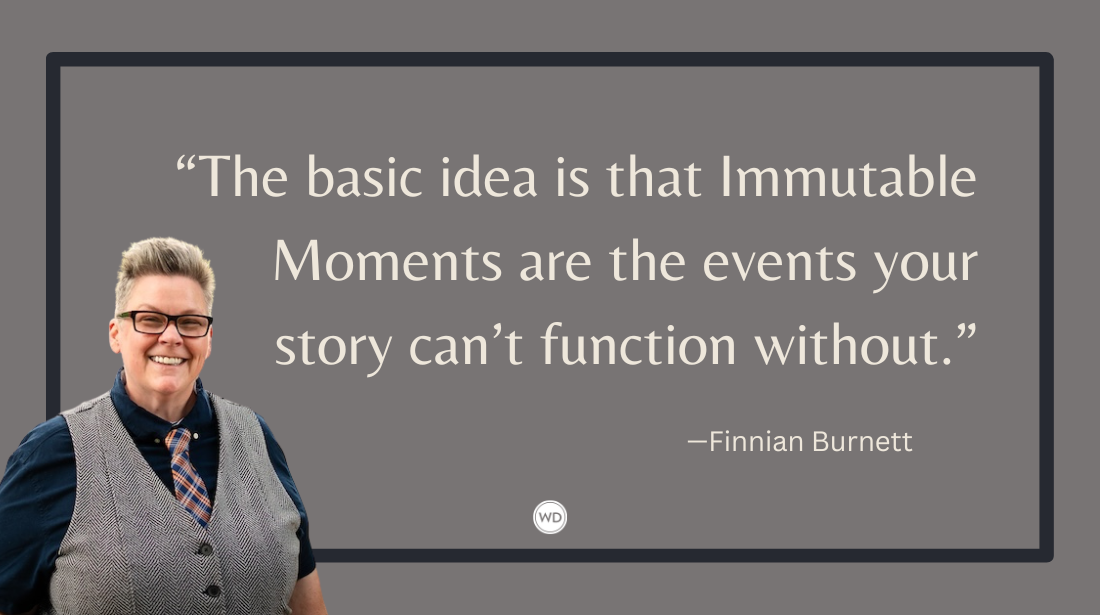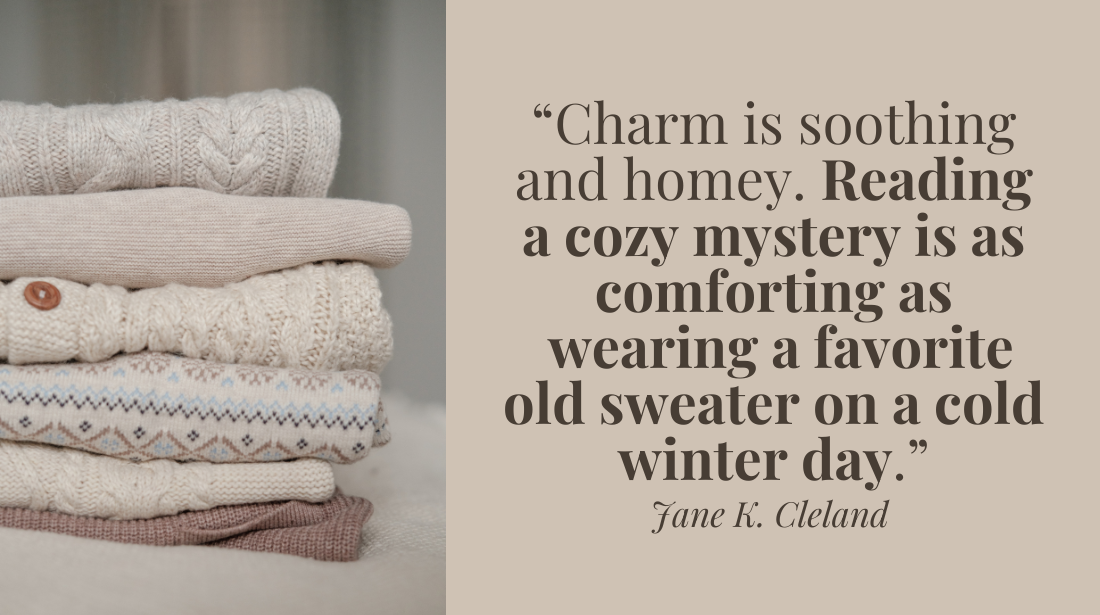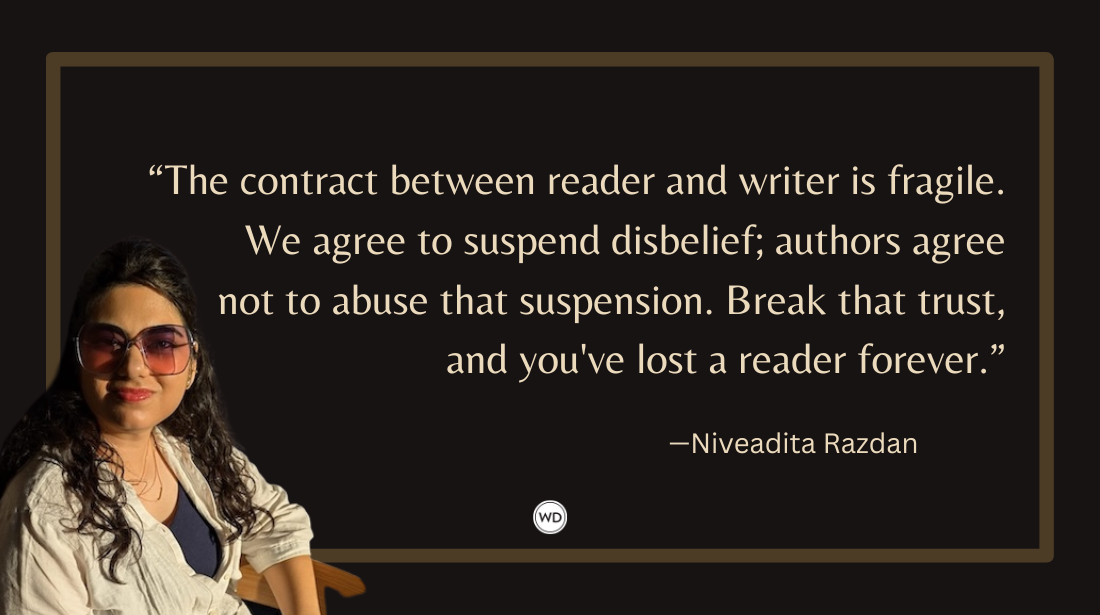You’re Just Too Good to Be True: How to Make Your Protagonist’s Love Interest More Believable—Flaws and All
In crafting fiction across genres, a perfect love interest is a tempting trap—and a trope. Writing flawed characters, even when your character is head over heels in love with them, is a must. Here’s how to make the object of your character’s affection believable and lovable while avoiding clichés.
Love interests aren’t restricted to the realm of romance. Most books—regardless of genre—have an attraction somewhere in the pages, be it a subplot or a subtle nod. What readers find attractive can vary widely, from the sensitive type to someone you’d want beside you in a dark alley. Fiction gives us the chance to explore all kinds of romantic leads, but writers often fall into the trap of writing the too-perfect love interest.
What’s the harm in that, you may say? Well, plenty.
Our job as fiction writers is to make people care about things that never actually happened to people that don’t really exist. It’s a tough metric. Characters need to feel like real people in order for the reader to be invested in them enough to continue turning pages to see what unfolds.
And—spoiler alert—perfect people are a myth. Just ask my ex-husband, who would often throw up his hands in frustration, and say, “I’m sure Jamie Fraser could have done it better.” To which I would respond, “Yes, he could have!”
Whether you’re writing a male or female love interest, there are tropes and traps that are easy for them to fall into, and tempting for you to write. The first weapon against writing clichés is being able to identify them. And when it comes to love interests, they tend to be split down gender lines.
The Manic Pixie Dream Girl
You might have heard that moniker before. But what exactly does it mean?
“Manic Pixie Dream Girl” (MPDG) is a term coined by film critic Nathan Rabin in 2007 to describe an increasingly common “bubbly, shallow cinematic creature that exists solely in the fevered imaginations of sensitive writer-directors to teach broodingly soulful young men to embrace life and its infinite mysteries and adventures.”
The MPDG is always attractive, quirky, and adventuresome, often the possessor of some great life-truth, and usually there to guide the main character to a better, more full realization of himself. Sounds great, right? Or maybe … too good to be true?
There are endless examples of MPDGs in pop culture, but to illustrate this trope more fully, let’s build our own, and then do some retooling to create a fully fleshed-out character.
IndieBound | Bookshop | Amazon
[WD uses affiliate links.]
Our MPDG changes her hair color every month—once her natural roots start to show, it’s time to change. She unfailingly paints her bicycle to match her hair-of-the-month, pedals everywhere, listens solely to swing music, and only on her Walkman … the cassette-tape kind. Which she found in a Salvation Army store while getting her new wardrobe—that she’s going to tear apart and creatively piece back together to create a brand-new collection of distinctly unique outfits. Her two dogs—named Dog and Cat—were adopted into her loving arms after they followed her home the night she stopped by a side alley to put all the cash she had into a random stranger’s mailbox. Her life is great without money, and she figures they probably need it more than she does anyway.
MPDG is always there for her significant other, even if it means biking across the city in the middle of the night after noticing a missed text saying he had a bad day. Bad days have to be fixed face-to-face, after all, and she’s here to help with homemade tomato soup and a comforter she just finished making from airbrushed squares featuring the album art of all her lover’s favorite bands. She has an important meeting in the morning that her career as an organic wedding-cake baker hinges on, but it’s more important to her that the one she cares for knows exactly where he stands—at the very top of her list.
Riiight. Before we get ahead of ourselves and cast Zooey Deschanel or Zoe Kazan to play her in the film adaptation, how do we take this Manic Pixie Dream Girl and turn her into just … a girl?
Writing Believable Female Love Interests: A Little Less Pixie
Let her roots show.
Literally, and figuratively. Color fades over time, as does the sparkle and shine of a new relationship. What’s going to be the cause of their first fight (which will happen)? How will both partners navigate the fallout?
Give her legs by giving her some wheels.
Vehicles are becoming greener every day, and she might need one when it’s time to take Dog and Cat to the vet. It probably has a decent stereo system in it, too, because who listens to swing quietly? Hmm … I wonder if her partner makes the tragic mistake of touching the dial? Or what if her bike gets stolen, and she has to ride the subway? Make sure her personality is intact, even without the transportation to match her hair.
Keep kindness believable.
Shopping at Salvation Army shows that she’s thrifty, but maybe instead of giving all her cash to a stranger, she puts the change from her shopping spree in the tip jar at the counter. (It’s illegal to put anything other than postage-paid mail in a mailbox, anyway.)
Make her a partner, not a parent.
The tomato soup and favorite playlist comforter might be a little (or a lot) overkill. Is she being a grandmother or a lover? Make room for some humor with a nice gesture gone wrong. Maybe Cat always comforts MPDG when she’s under the weather, so she thinks a pet-ride-along visit will be just the thing … unaware that her new beau is allergic. Will he react with grace to a good deed gone awry? Or is it going to take an antihistamine or two before the dust settles?
Let shit happen.
Her organic wedding cake business is taking off, but it’s hard to sift gluten-free flour while composing sympathetic responses to the third self-pitying text from her significant other. Maybe instead of rushing over with food and blankets she texts back a quick, Suck it up. How will that first terse text land?
But—you insist—there are quirky, giving, caring people in the world. Why can’t I write her that way? You can, as long as you’re not committing the biggest offense of the MPDG: lacking agency.
Author Emery Lord found a terrific way to upend this trope when writing her character Vivi in the young adult novel When We Collided. Vivi has all the hallmarks of an MPDG—she likes to deck herself out in retro-Hollywood clothes, works in a paint-it-yourself pottery store, insists on wearing only red lipstick, and loves inviting Jonah’s little siblings along—all three of them—on their outings.
Vivi’s perfect … at least when we are seeing her from Jonah’s point of view. In her own chapters, Vivi sometimes struggles getting out of bed and spends each morning tossing what’s supposed to be her daily medication into the ocean—convinced she no longer needs it now that Jonah is in her life. Not all her smiles are manufactured, but when she’s with her new boyfriend, she increasingly finds herself stamping them on, determined to be the ray of light he needs to illuminate his own life.
Vivi’s attempt to be a MPDG for someone else’s benefit backfires magnificently, turning her into something new—the Manic Depressive Pixie Dream Girl. And while that might not be as dreamy, it is most definitely real.
The Sensitive Intelligent Alpha Male
No, you haven’t heard of the SIAM. That’s because I made it up. The acronym, not the concept—crack any book.
The SIAM is the MPDG’s counterpart. He’s physically impressive, sexually gifted, kind, smart, sensitive, and never displays attraction or interest in anyone other than his intended. You’ve seen him around … on book covers, anyway.
Much like the MPDG, the SIAM exists in every genre, not just in the pages of the books where plot happens between the sheets. And as with our Pixie Dream, we’re going to make our own Sensitive Alpha, then get him down to real-world proportions. Probably literally.
Our SIAM is well-built, and he knows how to show it without sporting a mesh tank. It’s easy to spot the lines of his muscles through the T-shirt promoting the camp where he works with underprivileged youth. It’s clear he doesn’t skip leg day, either: That’s evident when he’s climbing a tree to rescue a kitten.
That kitty is, of course, going to be a gift for his significant other, along with the book of poetry he wrote himself, inspired by the object of his affection. He’ll deliver it with a gleam in his eye that promises more later … a lot more, because he’s got a healthy appetite.
Speaking of which, he brought dinner. Those professional cooking classes he’s been slipping in after work and before his nightly run have been paying off, and his lover can rest assured that the cute gourmand instructor can flirt all she wants—this guy is off the market.
Not a bad deal, right? Also, not a real person. Let’s make this oh-so-dreamy fella the kind of guy you can expect to bump into on the corner.
Writing Believable Male Love Interests: A Little More Human
Put on a few pounds—or take them off.
That body probably isn’t perfect, because that would require spending every minute in the gym—not at the camp where he works, or with the object of his affection. Besides, a chiseled fella might make his love interest feel insecure by comparison. Does his significant other have a weakness for good arms? Give him those, and when she overlooks his chicken legs it’ll be because she knows she isn’t perfect, either.
Take it down a notch.
Cooking classes might be a little pricey for our guy, since he works at a camp for the underprivileged. That doesn’t mean he can’t splurge for her favorite pizza, and if he chooses to rescue a kitten on the way to his destination, that’s basic human decency. But first, he should check that it doesn’t belong to someone, rather than popping a bow on its neck and gifting it to his beloved. Maybe this detour will make him late for their rendezvous, and he invites the object of his affection along for a ride to the animal shelter, only to discover she’s more of a dog person. What might be their take on this age-old problem?
Set some bedroom boundaries.
Consider that a bellyful of pizza could put some limits on the bedroom calisthenics. That doesn’t mean fun can’t be had, but perhaps not into the wee hours. He might be training for a marathon, but it’s the kind you wear clothes for. While pounding the pavement for those 26 miles on the weekend, his eyes might drift to the runner who is pacing him. How will his pillow-mate feel to see those eyes sliding over someone else, when the only thing they did in bed last night was flicker in deep REM sleep?
Employ poetic justice.
The poetry? Write on, brother. We’ll forgive you if it rhymes. Or, maybe his counterpart has a Master of Fine Arts degree and returns his missive of love with a few red pen marks.
*****
One sensitive alpha male who is far from perfect is Robert Galbraith’s (aka J.K. Rowling’s) private detective, Cormoran Strike. Strike admits to being a little overweight. He’s a hulking presence, and more than once the hair on his head is compared to hair that grows … elsewhere.
An amputee with chronic pain issues, a bit of a temper, and a fondness for pubs, Strike can’t even show his new secretary, Robin, the courtesy of remembering her name upon their first meeting. But sensitivity lurks beneath, and he—believably—beds a supermodel in the series’ first book. Women flock to Strike despite his shortcomings, something that the engaged Robin finds herself oddly irked by.
Now, these examples may seem specific, but they’re meant to prove a point. The perfect love interest might seem like a good idea while crafting your novel, but if you want your readers to relate, you’re going to have to put some cracks in that veneer. Don’t forget, your readers probably have someone that they care for in real life—someone who, being an actual human, has some rough edges. Giving your love interest a few as well might just appeal to your characters, and your readers, even more than the irresistibly unattainable figure from your wildest dreams.
Learn more about writing flawed characters in the online course Charcter Development: Creating Memorable Characters.
Mindy McGinnis is an Edgar Award–winning author who writes across genres, including sci-fi, fantasy, historical, and contemporary. Her most recent title, This Darkness Mine, is a psychological thriller with highly imperfect—maybe downright unlikable—love interests. mindymcginnis.com








